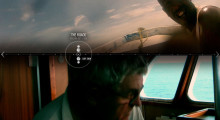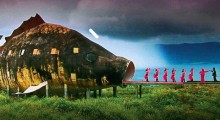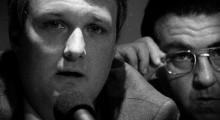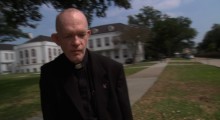Documentary
-
The Kids Are All Right: Matt Wolf on Teenage

Based on Jon Savage’s 2007 book Teenage: The Creation of Youth Culture, Matt Wolf’s elliptical and handsome documentary Teenage delves into the history of teen-hood, revealing how those formative years between 12 and 20 produced generations that were cultural forces to be reckoned with in the West during the 20th century’s earliest decades. Using a collage style that includes archival footage, newsreels, dramatic reenactments (anchored by recognizable young actors such as Jenna Malone and total newcomers found by street-casting impresario Eleonore Hendricks), the movie takes us to pre-war Germany, through the pages of diaries of midwestern 15-year-olds, and to dance […]
by Brandon Harris on Mar 16, 2014 -
“That’s My Brain On Screen…”: Rachel Boynton on Her African Oil Exploration Documentary, Big Men

In a world of simplified, cable-news talking points, documentary filmmaker Rachel Boynton makes layered, complicated films exploring the nexus of politics and personality. With Our Brand is Crisis, Boynton — one of Filmmaker‘s 2005 25 New Faces — traveled to Bolivia to cover the 2002 election, embedding herself both within the campaigns of local candidates as well as the war room of hired-gun U.S. consultants Jim Carville and his GCS Associates team. Big Men, opening today, is her second feature, and it has similarly required an immersive, years-long process. She began the process of considering the film before its so-called […]
by Scott Macaulay on Mar 14, 2014 -
Five Questions With Last Hijack Directors Femke Wolting and Tommy Pallotta

Femke Wolting & Tommy Pallotta’s experimental doc Last Hijack sees the venn-diagramming of a rigorous interview style and breakout swatches of rotoscoped animation, ala Waking Life (which Pallotta produced.) In lieu of philosophical digressions or convoluted dream sequences, the filmmakers use animation to depict the unfilmable: nailbiting raids by Somali pirates, led by one Mohamed Nura, who casually recounts his adventures to the filmmakers between mouthfuls of khat. Never feeling doctrinaire, the film takes an earnest stab at correcting the way the West considers seaside piracy, delineating a cycle of corruption and violence starting with Mohamed’s father. Wolting and Pallotta […]
by Steve Macfarlane on Mar 14, 2014 -
Full Frame Film Festival Announces 2014 Lineup

The Full Frame Documentary Film Festival today announced its lineup for the festival to be held April 3-6 in Durham. Along with the full list of feature and short documentaries are a Full Frame Tribute to veteran documentarian Steve James and the titles in the Thematic Program, which this year is called “Approaches to Character” and is under the curation of Lucy Walker. In a response to the honor of a retrospective, James said, “I’m excited to have so many of my films play again in front of the appreciative audiences at Full Frame. It will give me a rare opportunity […]
by Randy Astle on Mar 13, 2014 -
The Women of SXSW: The Winding Stream Director Beth Harrington

Following her “The Women of Sundance” article in our print and online additions, Danielle Lurie continues her coverage of female filmmakers with a series of pieces highlighting women directors at SXSW. In this email interview, she talks with the director of the documentary The Winding Stream, Beth Harrington. The film premieres Saturday, March 15 at 7 PM at the Ritz Theater on Sixth St. Filmmaker: Why this movie? Why did you decide to do it? Harrington: I’m a filmmaker and a musician, and about ten years ago I made a film about women rockabilly singers called Welcome to the Club. It did well, […]
by Danielle Lurie on Mar 11, 2014 -
The Women of SXSW: The Great Invisible Director Margaret Brown

Following “The Women of Sundance” article in our print and online additions, Danielle Lurie continues her coverage of female filmmakers with a series of pieces highlighting women directors at SXSW. In this email interview, she talks with the director of the Documentary Competition title, The Great Invisible, Margaret Brown. Filmmaker: Why this movie? Why did you decide to do it? Brown: After the [Deepwater Horizon] spill, my dad started sending me pictures of our bay house in Alabama surrounded by boom, which BP was using to prevent the oil from getting in our marshes. Seeing my childhood invaded in this way was […]
by Danielle Lurie on Mar 10, 2014 -
It Came From Inside the House: Community, Criticism and The Act of Killing

For much of the past decade, one constant gripe within the world of documentary has been a need for more writing and better criticism about the craft of the filmmaking (as opposed to summaries of the plot or lionizations of the subject). So why have two recent, very critical op-ed pieces about The Act of Killing drawn such heat? The answer lies in both the source of the criticism and the method. It’s certainly not uncommon for there to be debate about documentaries, and often that debate is most animated amongst members of the oft-mentioned documentary community: an alternately loose […]
by A.J. Schnack on Mar 10, 2014 -
The Women of SXSW: Ukraine is Not a Brothel Director/Producer/Editor Kitty Green

Following “The Women of Sundance” article in our print and online additions, Danielle Lurie continues her coverage of female filmmakers with a series of pieces highlighting women directors at SXSW. In this email interview, she talks with the director of the SXGlobal documentary, Ukraine is Not a Brothel, Kitty Green. Filmmaker: Why this movie? Why did you decide to do it? Green: Ukraine Is Not A Brothel is a feature documentary about the topless Ukrainian feminist movement FEMEN. The film follows these “titillating” activists as they wage a war against patriarchy in a corrupt and poverty-stricken Ukraine. I came […]
by Danielle Lurie on Mar 9, 2014 -
Lost in Translation: Public Hearing

If you want to make a movie, you need a good script. Or, at least that’s what they tell you. A script gets the talent, which gets the financing (the two are really synonymous). The other thing you’ll need, of course, is luck. First-time filmmaker James N. Kienitz Wilkins can thank Google for both (not the money part though). While cruising the Internet in 2007, Wilkins came across a transcript of a public hearing on a town hall website. It described in detail a well-attended public hearing in Allegany, New York, population 8,000. At issue was a proposal to replace […]
by Paul Dallas on Mar 7, 2014 -
Nailing the Score of the Art Forger Documentary Art and Craft

Art and Craft follows prolific art forger Mark Landis just at the moment his elaborate 30-year con is exposed. What follows is a guest blog by filmmakers Sam Cullman, Jennifer Grausman and Mark Becker about a central consideration in making this film. Art and Craft is in the final days of a Kickstarter campaign to raise finishing funds, including monies needed to mix the score they write about here. When we first read The New York Times story about Mark Landis in 2011, we were immediately intrigued — what kind of art forger donates his work to museums instead of […]
by Art and Craft on Mar 6, 2014










